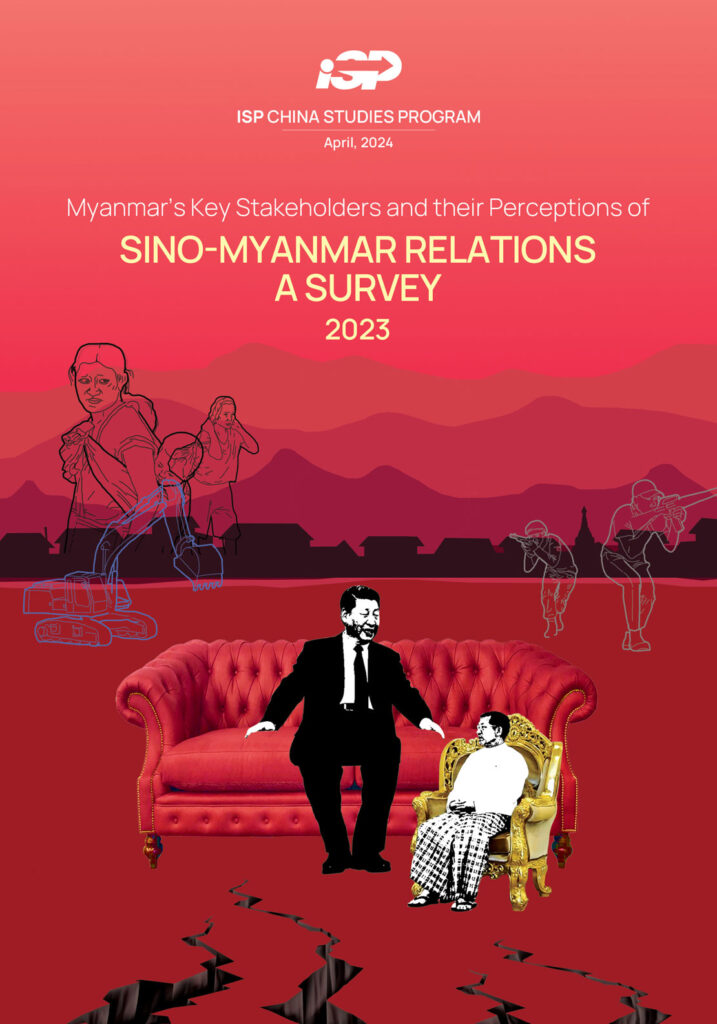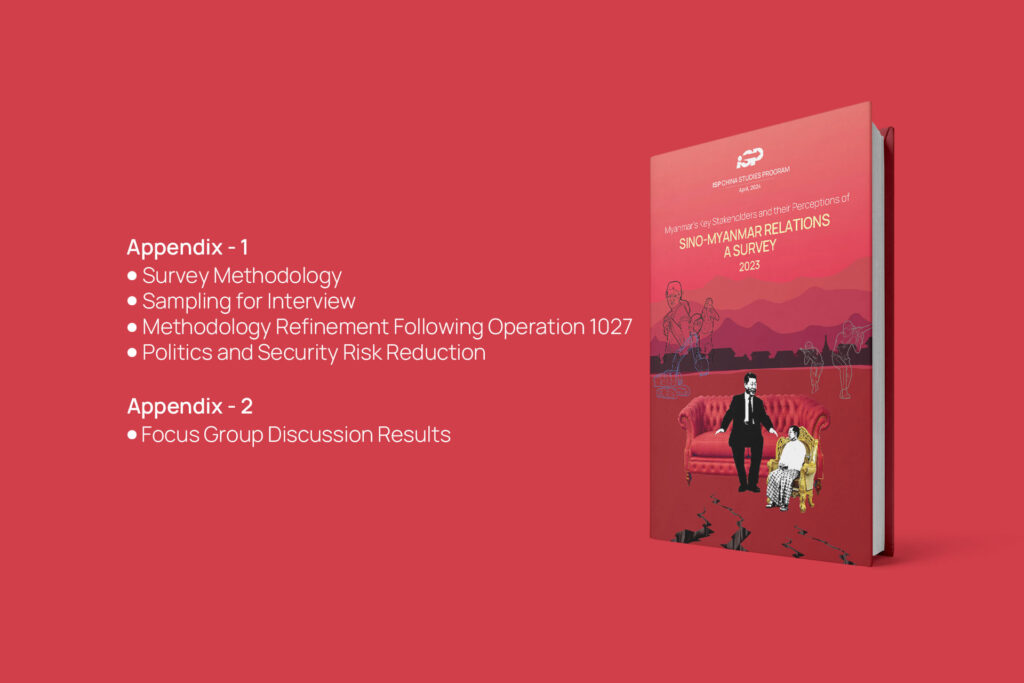Appendix – 1
Survey Methodology
This survey employed a quantitative research methodology implemented in four steps. The first stage encompassed pre-survey arrangements and formulating survey design, which entailed constructing a work plan, conducting focus group discussions with potential participants, developing baseline data and validating existing data.
The second stage involved group sampling, revision of last year’s questionnaires and questionnaires development. Additionally, the comparison and analysis of this year’s survey results with those of the previous year (2022) were conducted during this stage. New questions pertaining to the trending issues in Sino–Myanmar relations were also incorporated. Furthermore, in the third stage, activities included sample group analysis, methodology refinement, drafting guidelines for enumerators and supervisors, the implementation of security protocols, the selection of enumerators, and the conducting of training sessions. During the fourth stage, conducting meetings with targeted sample group individuals, followed by data entry, analysis, and report writing.
For the pre-survey preparation and construction of the sampling frame, ISP-Myanmar and People’s Alliance for Credible Elections (PACE) worked together to formulate the survey’s objectives and its framework, to select methods for analysis, as well as to prepare the survey questions. Moreover, individuals from the sample population were selected using a sampling frame for the sample population inquiry. This stage involved conducting personal meetings with key stakeholders in Myanmar as well as online meetings with political parties, civil society organizations, and representatives from various economic sectors, with over 20 leaders and experts. As part of the pre-survey preparation, discussions were held with over 120 individuals to explain the survey. To ensure the survey’s reliability and validity, measures were taken including setting standard values. A pilot study was carried out, and expert feedback was solicited as well.
Awareness of Sino–Myanmar relations was the main criterion for selecting survey participants. For this reason, random sampling method was difficult to be operationalized. Therefore, ISP-Myanmar applied a purposive sampling method to categorize survey participants, and the sampling was based on the target respondent’s capacity to influence policies related to Sino–Myanmar relations.
ISP-Myanmar identified individuals meeting specific criteria from six distinct communities: (1) political society, (2) civil society organizations, (3) the business community, (4) leaders of ethnic armed organizations (EAOs), (5) prominent individuals, such as scholars, professionals, activists, influential social and religious figures, and (6) leaders of PDFs/LDFs that emerged during the Myanmar’s Spring Revolution.
Following the selection of these communities, baseline data was gathered utilizing information from key informants including the websites of the SAC’s Union Election Commission (UEC) and the Union of Myanmar Federation of Chambers of Commerce and Industry (UMFCCI). Additionally, data were collected from preliminary discussions with leaders of various communities, civil society organizations from Myanmar and Thailand, EAOs, and PDFs/LDFs. Expert advice was utilized to assess the participants’ knowledge on Sino-Myanmar relations, considering their expertise, engagement, and influence on Sino-Myanmar policy and geopolitics.
The survey team selected members from 61 political parties that won seats in national and local legislatures (Hluttaw) in 2015 and 2020 and that are located in Kachin State, northern Shan State, Mandalay Region, Magway Region and Rakhine State. However, many political parties have unregistered since the State Administration Council (SAC) amended the political parties registration law. These are areas where the Chinese government-financed China–Myanmar Economic Corridor (CMEC) project will pass through.
The team also selected 218 individuals, particularly from civil society organizations that are: 1) working on research projects related to Sino–Myanmar relations, 2) monitoring Chinese-financed projects and their impacts on environmental and land issues, and 3) supporting the rights of local communities.
The research team also approached a total of 150 union and state level business community members who are directly involved in the CMEC (especially those involved in investment and trade projects). This selection was based on data received from the Union of Myanmar Federation of Chambers of Commerce and Industry (UMFCCI).
Moreover, the survey team selected 133 individuals working on research related to Sino–Myanmar relations, well-known scholars and experts who can influence policy issues, activists, leaders of EAOs and influential persons from social and religious groups. Entities designated as EAOs include solely those that have arisen as a result of ethnic affiliations and those that have engaged with both the preceding governments in formal and informal capacities, a total of 23 groups.
Similarly, in the process of identifying newly emerged armed groups like PDFs/LDFs, priority was given to those operating in regions where Chinese investments were located.
Additionally, the team considered the size of their forces, selecting groups with 100 or more members, as well as groups designated as “active” by ISP-Myanmar’s Conflict data criteria which has three levels: active, rule and control. Utilizing these criteria, a total of 57 PDFs/LDFs were chosen.
In this manner, a baseline dataset was established, comprising a total of 642 individuals from six key stakeholders communities.
Sampling for Interview
For the interview sample selection, individuals from these six communities were selected based on the baseline data established for the research. Proportionate samples were selected from the baseline data of each community. However, political parties, politicians and PDFs/LDFs were found to be unevenly represented compared to civil society organizations and the business community. Therefore, additional respondents were added to these groups based on the baseline data. Additionally, the number of EAO respondents was lower in comparison to prominent individuals within the community. As a result, additional samples were added to ensure the representation of their perspectives based on the baseline data. A mixed proportion approach was consequently employed to identify the individuals for the interviews.
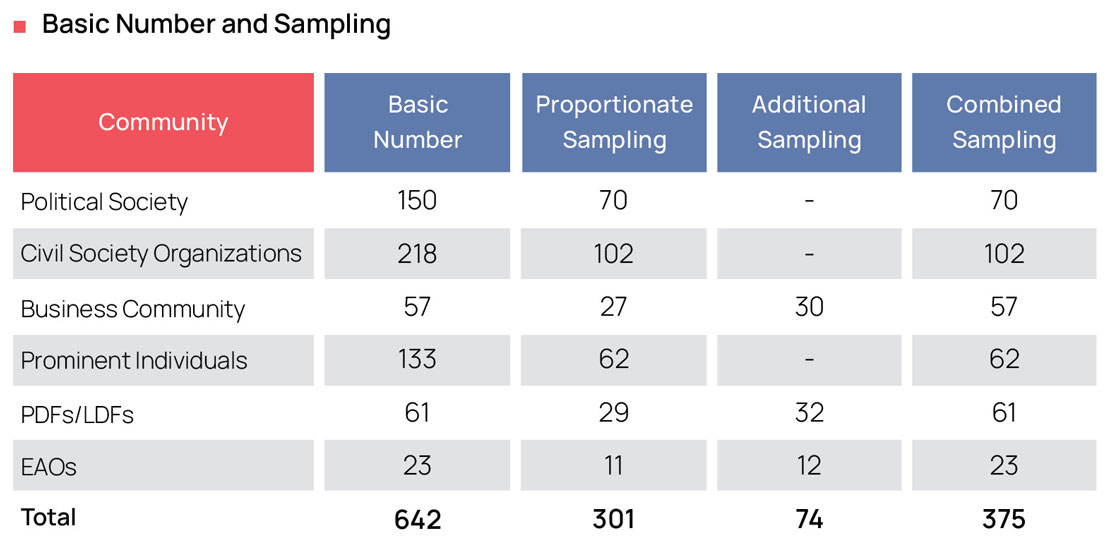
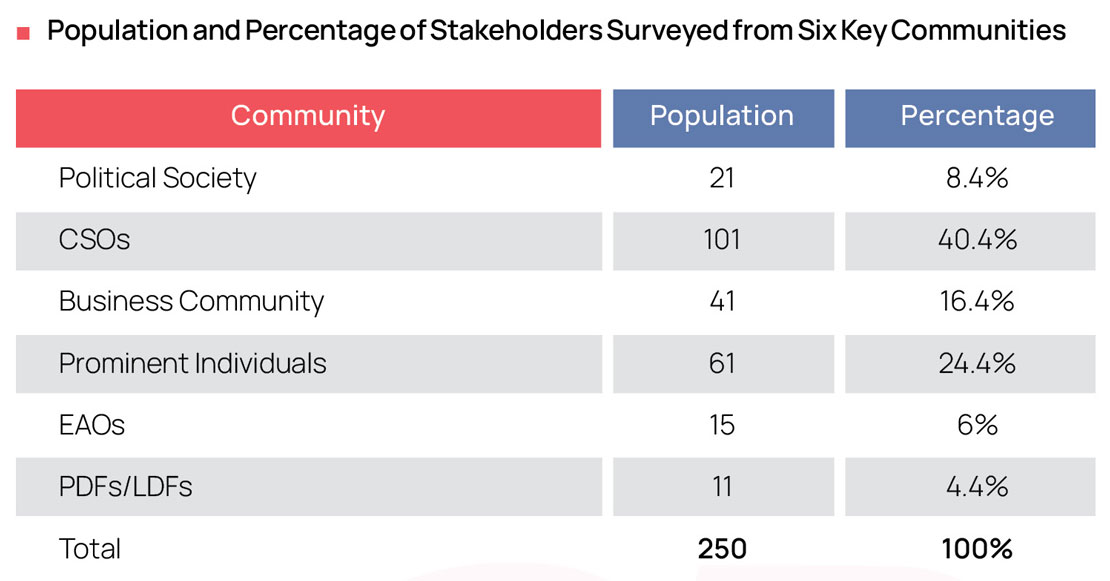
In the survey, the selection of participants aimed to ensure gender parity. However, an equal gender balance amongst survey participants was not possible, due to the fact that the majority of the community leaders selected based on the China expertise criteria were men and among the women leaders, many of them have to go into hiding following the coup. Despite these conditions, 191 men
(76 percent) and 59 women (24 percent) participated in the survey. This represents a one percent increase in women’s participation compared to the previous survey, in which there were 49 women participants (23 percent of the total 215 participants).
The current survey was able to query 250 individuals from six communities. Among those, there were 21 individuals from political society, 101 from civil society organizations, 41 from the business community, 61 prominent individuals, 15 from EAOs and 11 from PDFs/LDFs.
To ensure a well-structured survey, ISP-Myanmar and PACE collaborated to develop a handbook aimed at systematizing the survey’s objectives and sampled results. This handbook encompassed all survey objectives and provided detailed instructions on how to achieve them effectively. It outlined approaches and procedures for interviewing participants, documenting their responses, and handling unexpected situations. Additionally, it included guidelines and ethical considerations for enumerators, particularly emphasizing the importance of impartiality and neutrality. The handbook offered a step-by-step guide on how enumerators should approach interviewing participants, particularly to avoid emotional distress for the survey participants.
The handbook’s appendix contained abbreviations for technical terms, serving as a reference for enumerators in the event if Myanmar’s key stakeholders had questions or confusion regarding these terms. The handbook includes instructions for interacting with respondents, addressing technical issues, and resolving misunderstandings. Additionally, it emphasizes that safeguarding the privacy of respondents is a top priority and provides guidelines to follow.
ISP-Myanmar organized specialized training sessions for enumerators two weeks before conducting the survey. These sessions aimed to enhance their understanding of the survey’s objectives, survey systems, the role of enumerators, guidelines and ethics, interviewing techniques, safety precautions, and key issues outlined in the handbook. Additionally, another specialized training session was conducted for enumerators to allow them to better understand China’s influence in different sectors of Myanmar.
Methodology Refinement Following Operation 1027
An unexpected event during survey design occurred during the survey deployment period: the Three Brotherhood Alliance (3BHA) launched Operation 1027 in northern Shan State. Consequently, an analysis was conducted to assess whether this event had any impact on the survey results. As a result of this, seven questions analyzing China’s role were reposed to 20 individuals (from different communities) who had previously been surveyed before Operation 1027, forming the control group via focus group discussions. In contrast, the treatment group comprised participants surveyed after Operation 1027; they were asked whether their views towards China had become more positive or negative after the operation. Given that the operation did not induce significant changes in the respondents’ perceptions of China, the survey results were considered to be not substantially affected. The outcomes of the focus group discussions are presented in Appendix 2.
Politics and Security Risk Reduction
In conducting the survey, strict adherence to research ethics was maintained, including the careful construction of politically sensitive questions. Additionally, comprehensive cybersecurity measures were systematically implemented for all parties involved. ISP-Myanmar ensured the provision of physical security and psychological safety for its members and enumerators.
Appendix – 2
Focus Group Discussion Results
Following the methodology, an analysis was conducted to determine whether Operation 1027 had an impact on the survey results. After Operation 1027 began, the respondents were asked Question Z, regarding any shifts in their perceptions of China. Additionally, a focus group discussion involving 20 individuals from various communities was conducted, and seven additional questions were posed to gauge the respondents’ perspectives on China’s role. The following outlines the results of these inquiries.
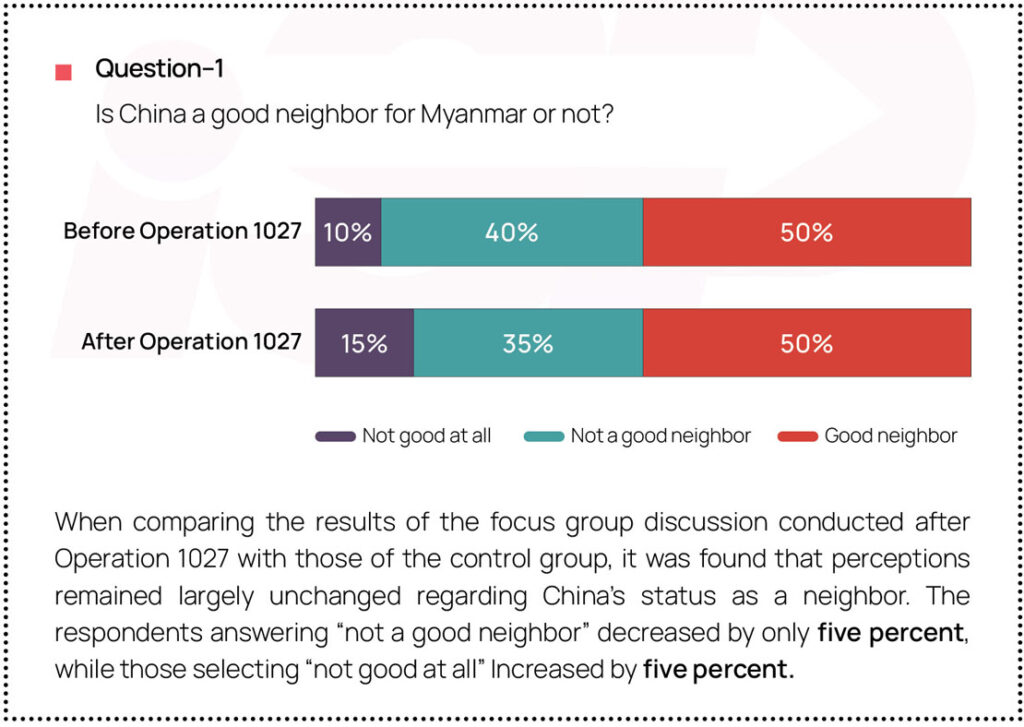
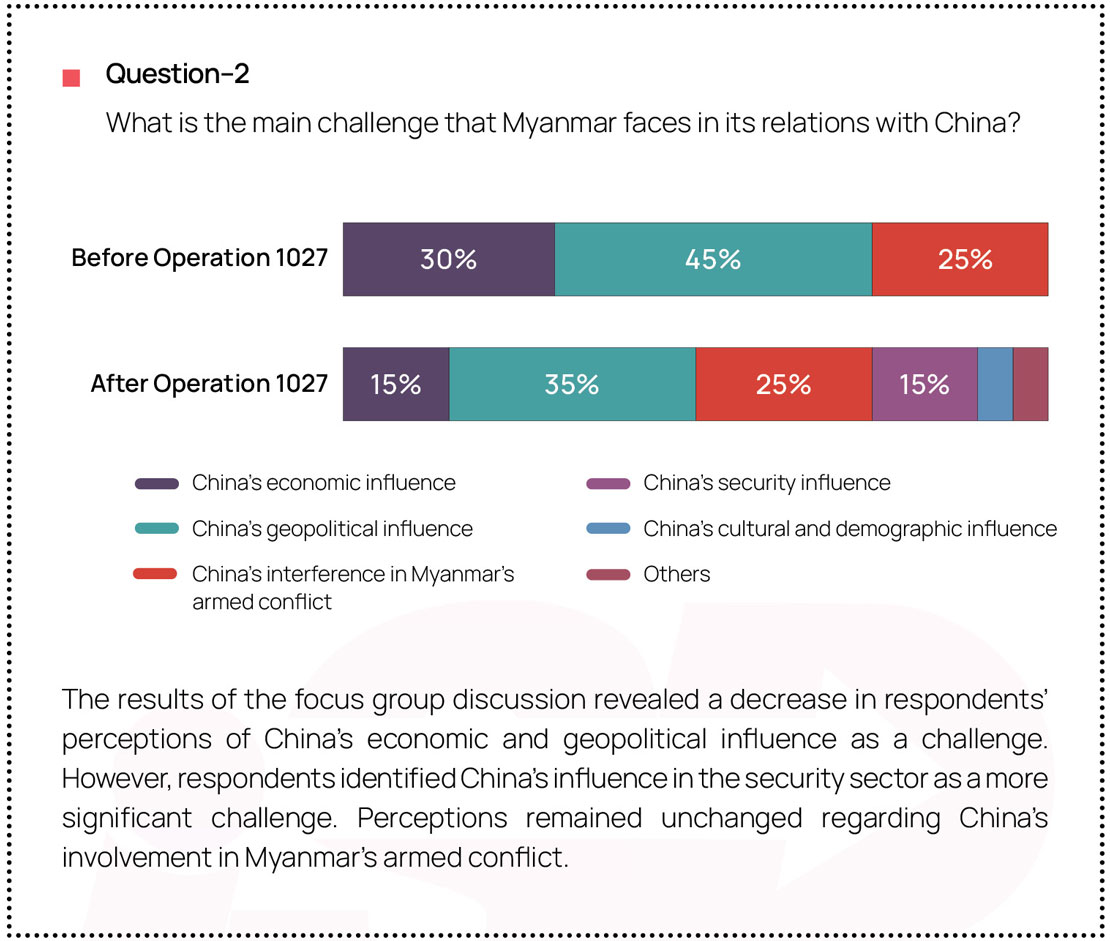
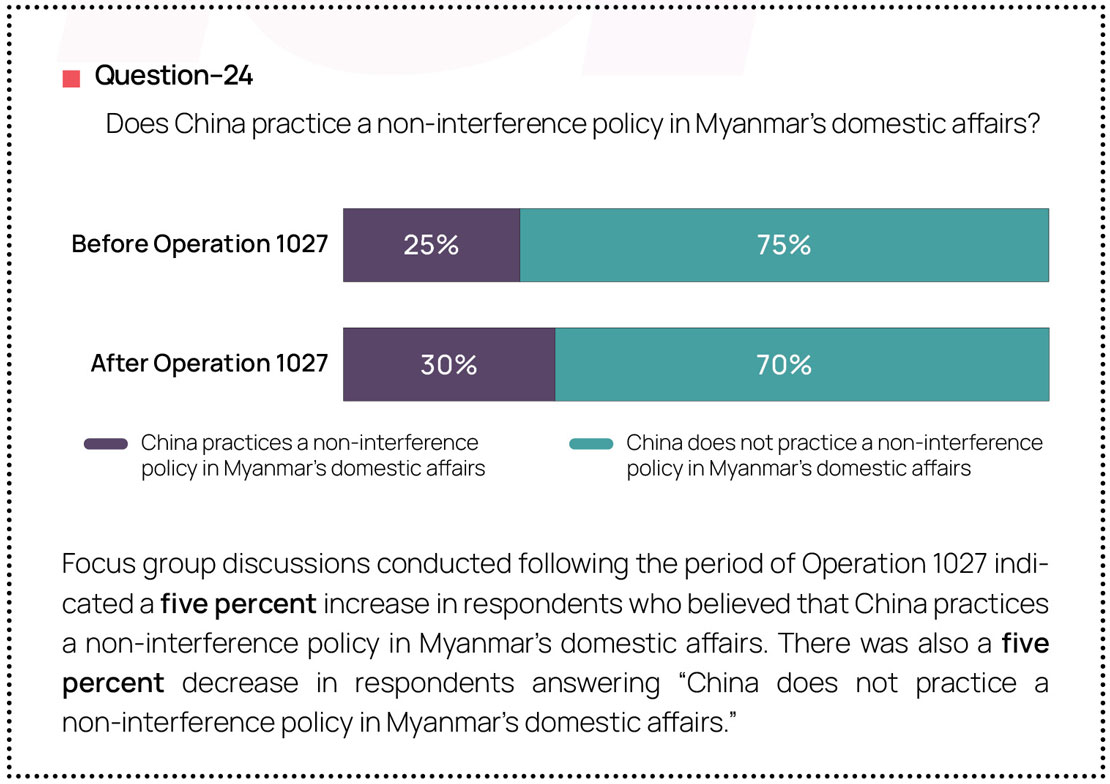
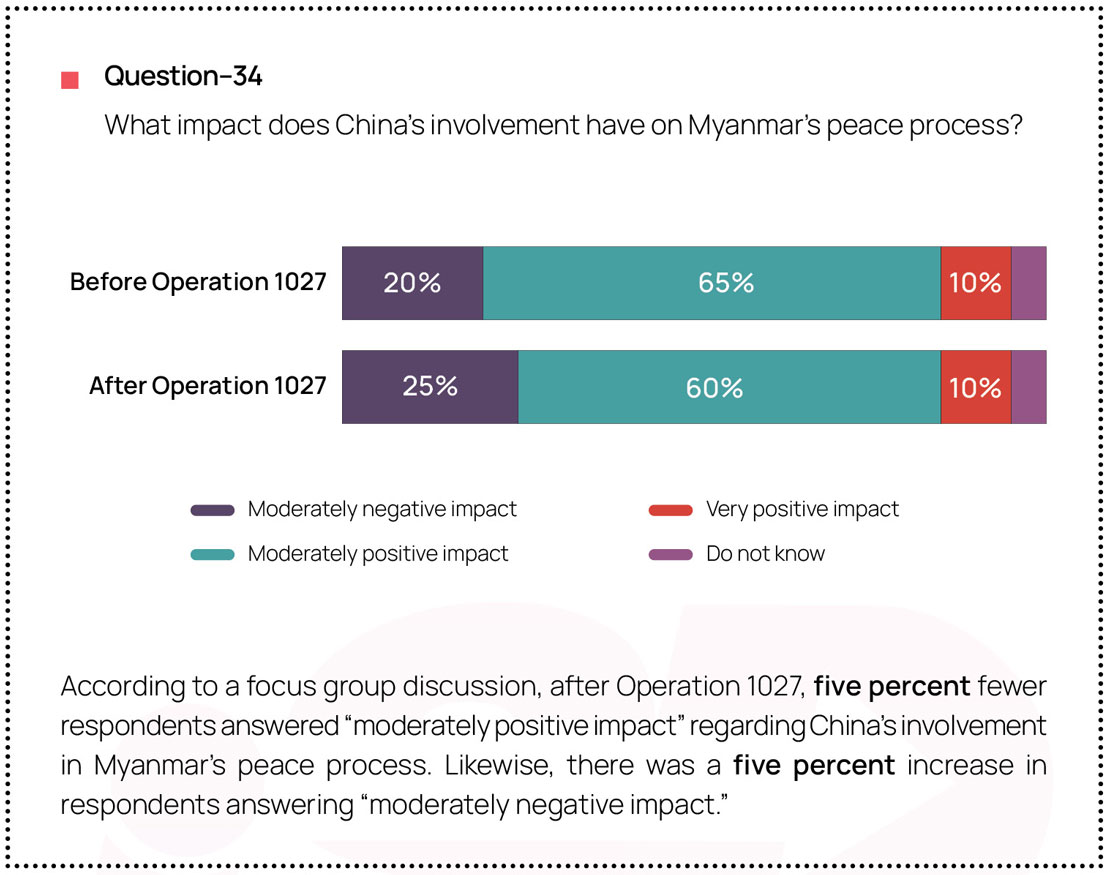
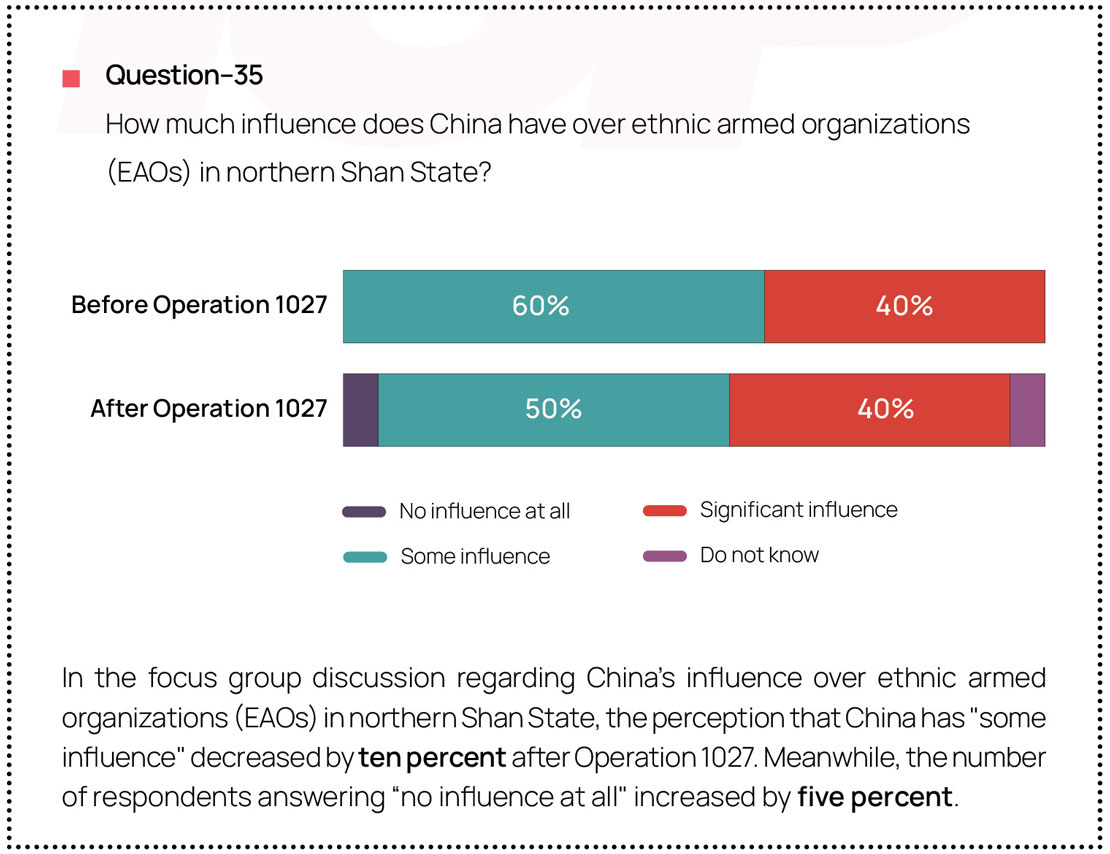
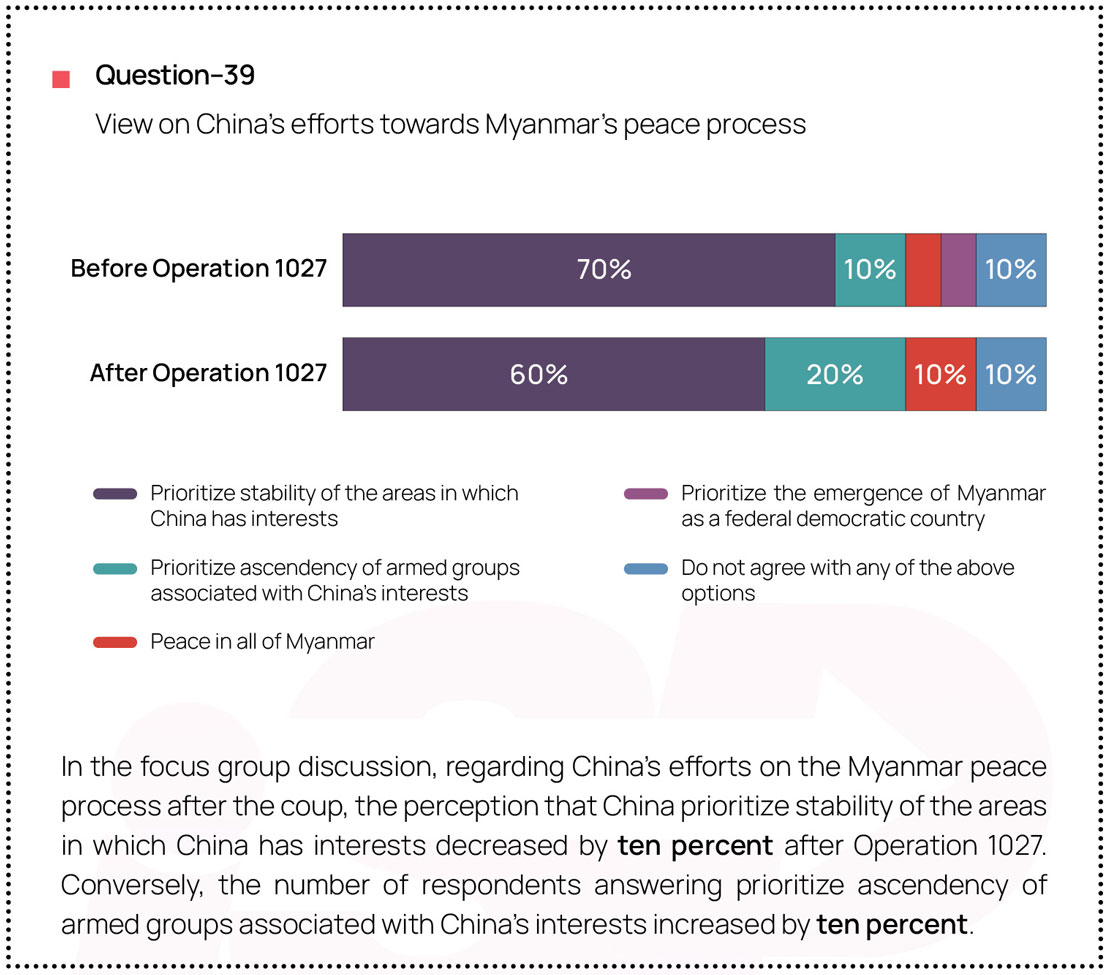
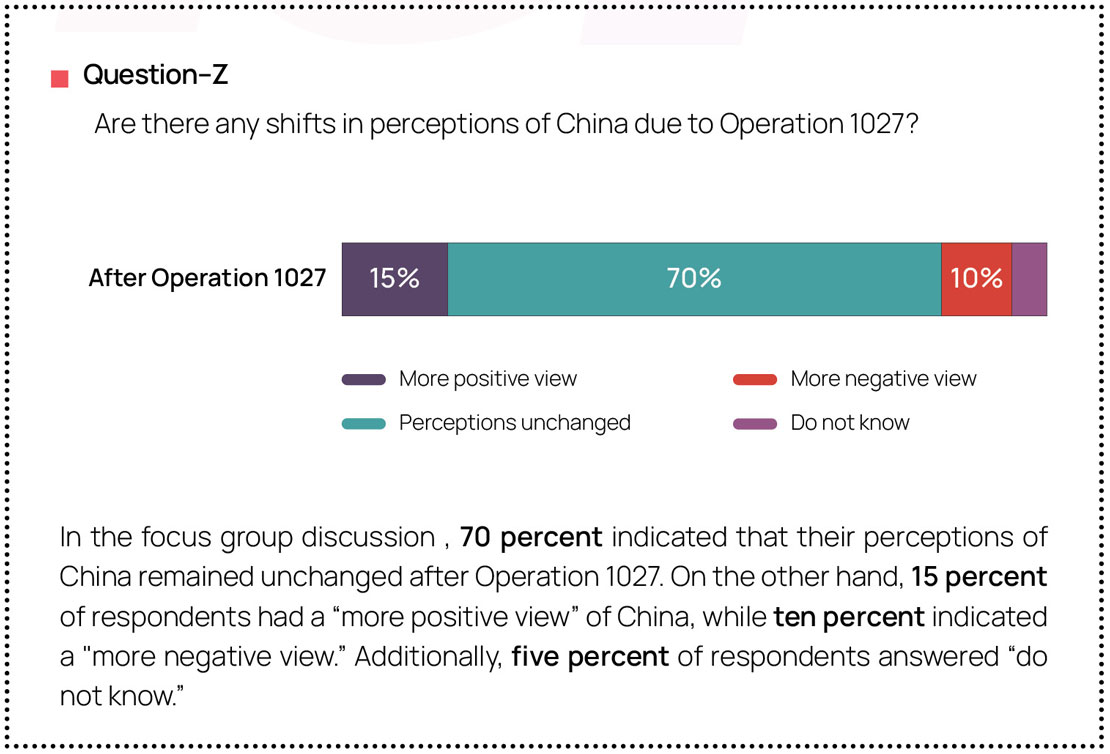
- Myanmar’s Key Stakeholders and Their Perceptions of Sino–Myanmar Relations – A Survey (2023) [Full Report]
- About the Survey
- Survey Brief and Key Findings
- General Perceptions of China
- Perceptions of the Role of China in Myanmar’s Political Crisis
- Perceptions of the Role of China in Myanmar’s Peace Process
- Sino–Myanmar Economic Relations
- China–Myanmar Economic Corridor (CMEC) Projects
- Myanmar’s Perceptions of China’s Regional Integration Projects
- Perceptions of China’s Soft Power
- Chinese Technology Usage
